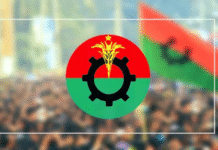Bangladesh government is going to shoot itself in the foot as it is considering banning the country’s most organized and largest Islamist party, the Jamaat-e- Islami Bangladesh (Jamaat). A number of powerful ministers and some government-backed political organizations have started raising voices to put a stop to activities of Jamaat, which is currently under tremendous pressure — its three key leaders have already hanged and many more are under trial for the crimes against humanity during the 1971 liberation war.
If Jamaat is kept out of the country’s political arena, there is every possibility that its resolutely committed and diehard members and workers, mostly young and aged below 45, might go underground and get involved in subversive activities to destabilize the country.
Jamaat has already had its wings clipped when the Election Commission delisted it following a Supreme Court order. Now banning it will be the last nail in the coffin, probably leaving it without options other than fight back for survival.
It is not hard to fathom that Jamaat has enough brains and brawn, both politically and economically, to shake the country. According to a research paper presented by a Dhaka University Professor, Abul Barakat, on December 12, profits from the enterprises belonging to Islamist fundamentalists were estimated at nearly SR1,250 million in 2014 and their accumulated profits for the past 40 years amounted to SR 50,000 million.
Jamaat is also one of the oldest political parties in the Indian subcontinent with a long history. It was founded during the British rule of India in 1941 as Jamaat-e-Islami and metamorphosed into Jamaat-e-Islami Pakistan, following the creation of India and Pakistan in 1947 when Bangladesh was assimilated into Pakistan.
With its deep roots in politics, Jamaat has experienced lots of ups and downs. Its major setback was its stand against the independence of Bangladesh and its great success was it was part of the government with two ministerial posts during the two regimes of Bangladesh Nationalist Party (BNP) under the then prime minister Khaleda Zia.
Jamaat has undoubtedly enormous economic clout and political influence not only at home but also in some foreign countries. It has sympathizers, active members and keen supporters among an estimated 10 million non-resident Bangladeshis (NRBs) living in the Gulf states, Malaysia, the UK, the US, Australia, Canada and other countries. Saudi Arabia alone has more than 1.5 million Bangladeshi expatriates. Over half a million British citizens are of Bangladesh origin.
A good number of NRBs are alleged to be providing financial and moral support to Jamaat, which is a major concern for the current Bangladesh government. Dhaka has already alerted some of the foreign countries where Bangladeshis live and work about the issue. For instance, Bangladesh government has informed its UK counterpart that a considerable number of British citizens are involved in stoking Islamist revival in Bangladesh.
Bangladesh government of Sheikh Hasina has kept kept a check on Jamaat by putting hundreds of thousands of its workers and supporters behind bars. The aim is not only eliminating it, but also to wean it away from BNP and weaken the combined strength of opposition parties. Now, the government’s next step to ban Jamaat is likely to bolster the BNP as nearly all the Jamaat members are expected to join it.
Judged by its local support, overseas links and economic strength, Jamaat should be encountered politically. Given its Islamist ideology, Jamaat may, someday, emerge as a key political party once it is purged from war crimes in the Muslim-dominated country of 160 million people.
Source: ArabNews.com









